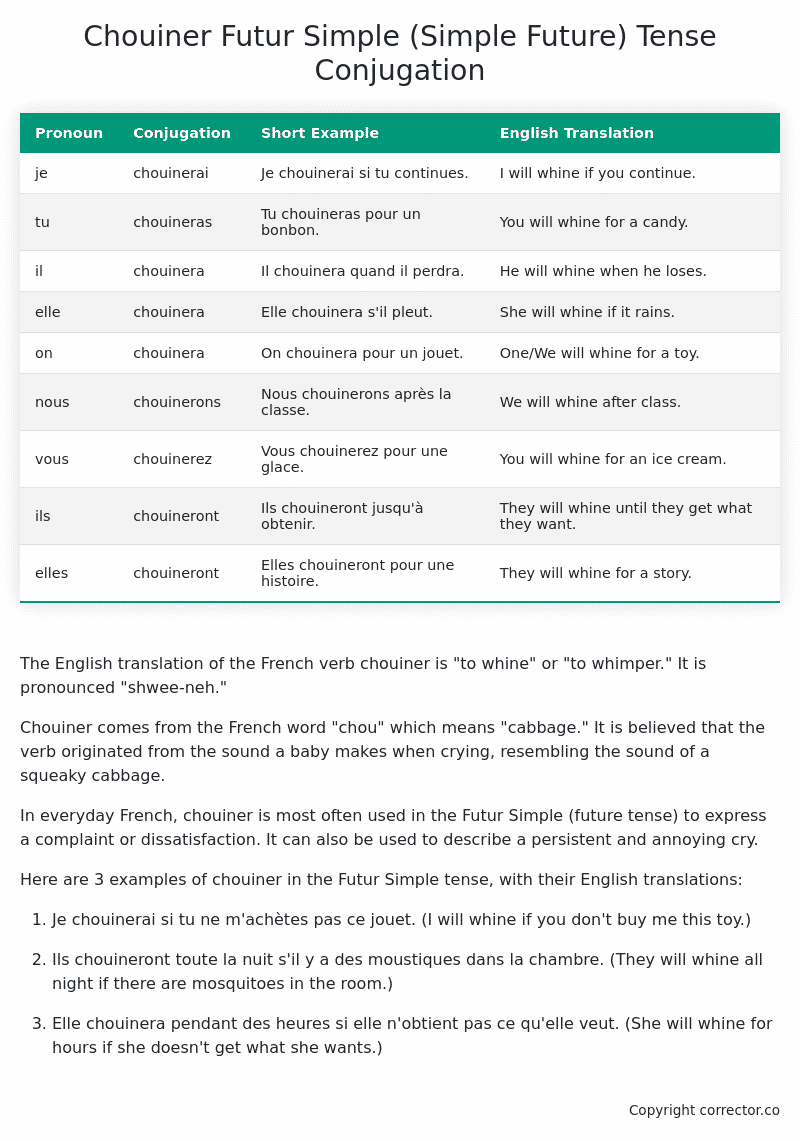Futur Simple (Simple Future) Tense Conjugation of the French Verb chouiner
Introduction to the verb chouiner
The English translation of the French verb chouiner is “to whine” or “to whimper.” It is pronounced “shwee-neh.”
Chouiner comes from the French word “chou” which means “cabbage.” It is believed that the verb originated from the sound a baby makes when crying, resembling the sound of a squeaky cabbage.
In everyday French, chouiner is most often used in the Futur Simple (future tense) to express a complaint or dissatisfaction. It can also be used to describe a persistent and annoying cry.
Here are 3 examples of chouiner in the Futur Simple tense, with their English translations:
-
Je chouinerai si tu ne m’achètes pas ce jouet. (I will whine if you don’t buy me this toy.)
-
Ils chouineront toute la nuit s’il y a des moustiques dans la chambre. (They will whine all night if there are mosquitoes in the room.)
-
Elle chouinera pendant des heures si elle n’obtient pas ce qu’elle veut. (She will whine for hours if she doesn’t get what she wants.)
Table of the Futur Simple (Simple Future) Tense Conjugation of chouiner
| Pronoun | Conjugation | Short Example | English Translation |
|---|---|---|---|
| je | chouinerai | Je chouinerai si tu continues. | I will whine if you continue. |
| tu | chouineras | Tu chouineras pour un bonbon. | You will whine for a candy. |
| il | chouinera | Il chouinera quand il perdra. | He will whine when he loses. |
| elle | chouinera | Elle chouinera s’il pleut. | She will whine if it rains. |
| on | chouinera | On chouinera pour un jouet. | One/We will whine for a toy. |
| nous | chouinerons | Nous chouinerons après la classe. | We will whine after class. |
| vous | chouinerez | Vous chouinerez pour une glace. | You will whine for an ice cream. |
| ils | chouineront | Ils chouineront jusqu’à obtenir. | They will whine until they get what they want. |
| elles | chouineront | Elles chouineront pour une histoire. | They will whine for a story. |
Other Conjugations for Chouiner.
Le Present (Present Tense) Conjugation of the French Verb chouiner
Imparfait (Imperfect) Tense Conjugation of the French Verb chouiner
Passé Simple (Simple Past) Tense Conjugation of the French Verb chouiner
Passé Composé (Present Perfect) Tense Conjugation of the French Verb chouiner
Futur Simple (Simple Future) Tense Conjugation of the French Verb chouiner (this article)
Futur Proche (Near Future) Tense Conjugation of the French Verb chouiner
Plus-que-parfait (Pluperfect) Tense Conjugation of the French Verb chouiner
Passé Antérieur (Past Anterior) Tense Conjugation of the French Verb chouiner
Futur Antérieur (Future Anterior) Tense Conjugation of the French Verb chouiner
Subjonctif Présent (Subjunctive Present) Tense Conjugation of the French Verb chouiner
Subjonctif Passé (Subjunctive Past) Tense Conjugation of the French Verb chouiner
Subjonctif Imparfait (Subjunctive Imperfect) Tense Conjugation of the French Verb chouiner
Subjonctif Plus-que-parfait (Subjunctive Pluperfect) Tense Conjugation of the French Verb chouiner
Conditionnel Présent (Conditional Present) Tense Conjugation of the French Verb chouiner
Conditionnel Passé (Conditional Past) Tense Conjugation of the French Verb chouiner
L’impératif Présent (Imperative Present) Tense Conjugation of the French Verb chouiner
L’infinitif Présent (Infinitive Present) Tense Conjugation of the French Verb chouiner
Struggling with French verbs or the language in general? Why not use our free French Grammar Checker – no registration required!
Get a FREE Download Study Sheet of this Conjugation 🔥
Simply right click the image below, click “save image” and get your free reference for the chouiner Futur Simple tense conjugation!

Chouiner – About the French Futur Simple (Simple Future) Tense
Formation of Futur Simple
For regular -er verbs (e.g., parler – to speak)
For regular -ir verbs (e.g., finir – to finish)
For regular -re verbs (e.g., vendre – to sell)
Common Everyday Usage Patterns
Conditional Statements
Interactions with Other Tenses
Futur Antérieur
Conditional
Present
Summary
I hope you enjoyed this article on the verb chouiner. Still in a learning mood? Check out another TOTALLY random French verb conjugation!


